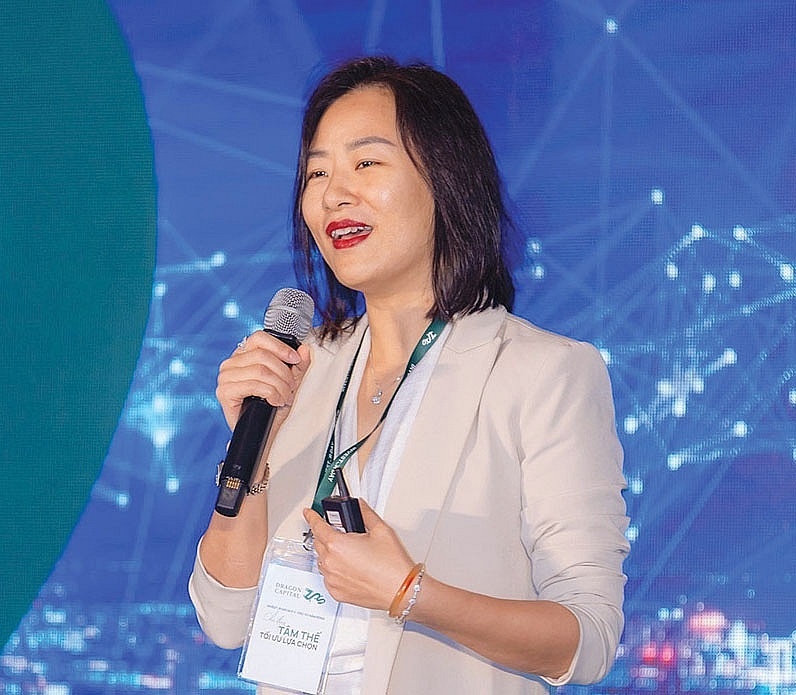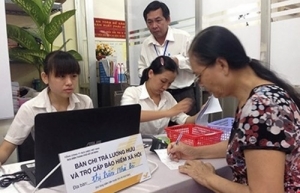Benefits of pension funds must be incentivised
Participation in voluntary pension funds yields considerable advantages for both employers and employees. Firstly, by adopting these policies, companies can retain key talent, thereby saving on recruitment costs. This offers a sustainable, long-term benefit for the organisation.
 |
| Luong Thi My Hanh, head, Domestic Asset Management Dragon Capital |
Secondly, pension funds serve as an effective vehicle for participants to actively save during their income-earning years, preparing financially for retirement – a period typically associated with higher expenses.
These funds are rigorously managed and supervised by several authorities, including the Ministry of Finance, supervisory banks, and the Ministry of Labour, Invalids and Social Affairs, to ensure legal transparency and stability over the long term.
Thirdly, engaging in these pension schemes provides substantial income tax benefits to both employers and employees. For international firms, this approach helps synchronise benefit schemes with global corporate policies across their operations in different countries.
For local enterprises, it signals a forward-thinking approach to human resource management, showcasing a commitment not only to immediate benefits but also to implementing long-term welfare policies that support employees throughout their careers.
Despite the legal framework for voluntary supplementary pension funds being in place for eight years, participation has been limited, with around 20,000 individuals enrolled – a very modest number.
In developed economies, voluntary pension schemes are extensively adopted, driven in part by effective government tax incentives. These incentives are designed to motivate workers to join pension plans and encourage companies to enhance their competitiveness in talent acquisition, ultimately allowing all employees the opportunity to partake in these retirement saving schemes.
In Vietnam, to boost participation from both employees and employers in pension funds, a significant increase in tax incentives is necessary to keep pace with inflation. An advisable benchmark could be equivalent to the contributions to the social insurance system – 22 per cent of salary, with a ceiling of approximately $1,500 per month.
Current regulations allow businesses a tax-deductible income of $125 per month per employee and individuals a deduction of $40 per month for personal income tax when they contribute to voluntary pension funds. These levels are low compared to countries with successful models of voluntary supplementary pension funds.
For instance, Thailand offers attractive tax incentives for employees participating in voluntary pension funds, with annual contributions deductible from personal income tax up to about $15,000 per year.
In Thailand, listed companies are required to establish pension funds that employees can voluntarily join. As of September 2023, the Provident Fund in Thailand managed approximately $14 billion, with about 42 per cent of the working population contributing.
In the United States, the 401K retirement fund programme allows a tax-deductible contribution ceiling of $23,000 per year. For individuals over 50, this limit increases to just over $30,000, and is adjusted annually to match inflation.
According to ICI Global, by 2023, the programme had amassed $6.9 trillion with 70 million participants. Additionally, individuals can also open individual retirement accounts with a tax-deductible limit of $7,000 per year. The total assets managed in this type of retirement fund amount to $12.6 trillion; half of this comes from 401K rollovers when individuals change jobs.
Enhancing awareness and understanding of the benefits of pension funds and personal retirement planning across the entire community of businesses and workers is crucial. The government’s role in guiding this, through organisations such as trade unions and associations, is vital in spreading this knowledge.
Moreover, current investment regulations should be reassessed. Under existing rules, half of pension fund assets must be invested in government bonds. This limits access to financial instruments that could potentially offer better investment returns for pension fund participants.
In countries with successful pension funds, participants can choose to invest their contributions in various financial instruments and have diverse asset allocation options, such as equity funds, government bond funds, and/or corporate bond funds, to optimise returns over the long term while meeting their risk tolerance.
Vietnam has the advantage of learning from and adopting successful models and policies from other countries to expand the development of pension funds and achieve sustainable growth. However, a determined effort is needed to close the developmental gap and comprehensively enhance the social security system, including voluntary supplementary pension funds.
Once the model for voluntary supplementary pension funds is established, the domestic stock market will benefit from substantial capital inflows from institutional investors, helping to balance the structure and cash flow in the market that is currently skewed towards individual investors. This is one of the key factors ensuring the stable and sustainable growth of the market.
 | Pension fund landscape to be diversified Driven by incrementally surging demand from a gradually ageing population, more credit institutions and consumer finance companies are diversifying their loan schemes, including loan programmes for retirees. |
 | Highest pension in Vietnam pays 5,200 USD per month The person with the highest pension in Vietnam receives more than 124 million VND (5,200 USD) per month, according to the Vietnam Social Security (VSS). |
What the stars mean:
★ Poor ★ ★ Promising ★★★ Good ★★★★ Very good ★★★★★ Exceptional
Related Contents
Latest News
More News
- 0.1 per cent tax proposed on each transfer of digital assets (February 05, 2026 | 17:27)
- Ministry of Finance tightens policy delivery at start of year (February 05, 2026 | 17:26)
- Vietnam steps up market reforms as FTSE Russell reviews upgrade progress (February 05, 2026 | 17:20)
- 2025 profits mixed amid strong energy and farming results (February 05, 2026 | 17:18)
- Cashless payments hit 28 times GDP in 2025 (February 04, 2026 | 18:09)
- SSIAM and DBJ launch Japan Vietnam Capital Fund (February 04, 2026 | 15:57)
- Banks target stronger profits, credit growth in 2026 (February 04, 2026 | 15:43)
- Vietnam on path to investment-grade rating (February 03, 2026 | 13:07)
- Consumer finance sector posts sharp profit growth (February 03, 2026 | 13:05)
- Insurance market building the next chapter of protection (February 02, 2026 | 11:16)

 Tag:
Tag:



















 Mobile Version
Mobile Version